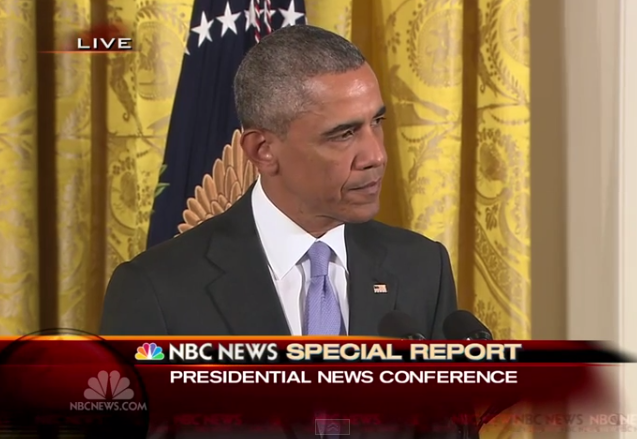Obama’s lawless Iran nuke deal victory

Two recent news analysis pieces highlight President Obama’s lawlessness in the case of his proposed nuclear deal with Iran.
Recall that about one week after the administration’s announcement that it had reached an agreement with Iran, Congressman Mike Pompeo revealed that the IAEA had told him and Senator Tom Cotton that:
Two side deals made between the Islamic Republic of Iran and the IAEA as part of the Joint Comprehensive Plan of Action (JCPOA) will remain secret and will not be shared with other nations, with Congress, or with the public. One agreement covers the inspection of the Parchin military complex, and the second details how the IAEA and Iran will resolve outstanding issues on possible military dimensions of Iran’s nuclear program.
A draft that was said to the same as the final text of one of these side deals was leaked to, and published by, the Associated Press. The second of the two still remains secret.
Asking Congress to approve an agreement, the complete terms of which it has not even seen, is of course absurd on its face. Even more absurd is that a sufficient number of Senators to sustain a Presidential veto of Congressional disapproval have agreed to do so.
Setting aside the ridiculousness of the request, however, it is also against the law. The Iran Nuclear Agreement Review Act of 2015 (also known by its sponsor as the Corker legislation) requires President Obama to transmit the entire agreement, specifically including “all related materials and annexes,” to Congress prior to Congressional review of the deal.
Notably, the President agreed to these terms.
Yet, Congress has not received the final texts of either of the two documents that Representative Pompeo and Senator Cotton discovered. Therefore, National Review contributing editor Andrew C. McCarthy has written, “the review process under the Corker law never began — by the law’s own terms.”
Congressman Pompeo partially agreed with McCarthy’s assessment in an op-ed in the Washington Post on Sunday.
The [Iran Nuclear Agreement Review Act of 2015] defines “agreement,” with exceptional precision, to include not only the agreement between Iran and six Western powers but also “any additional materials related thereto, including . . . side agreements, implementing materials, documents, and guidance, technical or other understandings, and any related agreements, whether entered into or implemented prior to the agreement or to be entered into or implemented in the future.” But the president has not given Congress a key side agreement between Iran and the International Atomic Energy Agency (IAEA). . . .
Because the president failed to submit the agreement in full, as the law requires, the 60-day clock has not started. . . .
McCarthy and Pompeo, however, differ on the consequences of this failure. Pompeo asserts that, because the review period has not started, “the president remains unable lawfully to waive or lift statutory Iran-related sanctions.”
McCarthy, however, writes that,
[B]ecause Congress never anticipated an Iran-friendly president like Obama, it provided presidents with authority to waive the existing sanctions — although not to lift them permanently. For now, this authority is Obama’s and he is entitled to use it, however reckless this may be.
For those of us who view this deal as a disaster, McCarthy’s conclusion is not a very satisfying one. Construing the statute as he does actually leaves the President with, in a way, more power (the power to temporarily waive sanctions without any Congressional vote at all) through non-compliance.
McCarthy opines that a Congressional refusal to vote on the deal due to the President’s non-compliance would further delegitimize the deal, making it easier for the next administration to repudiate it. Maybe this is so.
Nevertheless, Congress must insist on full disclosure of all of the deal’s written provisions, as the law requires. It should resort to the federal courts to do this if necessary (though there is a separate question of whether the agency in possession of the documents, the IAEA, would be subject to the jurisdiction of the US courts).
Congress and the public have a right to know what is being agreed to, and not to be subjected to more Gruber-like disclosures two years or so from now.
———————
Mirabelle is a non-practicing lawyer and blogger, writing about Israel, the US-Israel relationship, and media bias at Israellycool.com. On twitter: @MirabelleW18
CLICK HERE FOR FULL VERSION OF THIS STORY